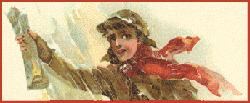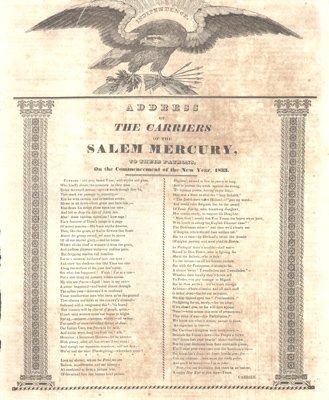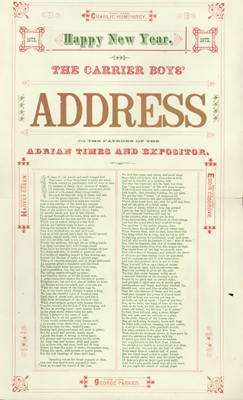
 |
Carriers' Addresses:
New Year's Greetings
|

Topics and Themes in Carriers' Addresses
Many Carriers' Addresses are humorous in nature; others
review the events of the past year, noting the deaths of famous persons or American
presidents. Foreign affairs of the day are often
prominently featured, and at midcentury the issues of slavery and the
Civil War are frequent topics. Poems of a patriotic nature
are commonly seen, and the growth of the country through immigration often mentioned.
The press comments on itself, and the very active religious
press presents its perspective on the events of the day. Perhaps most illuminating
today are the poems that comment on the fads, fashions, and
inventions of their day. And sometimes, the carrier just wants a tip!
 Humorous
Poems
Humorous
Poems
New Year's address by the carriers, to the patrons of the
Microcosm. Providence, January 1, 1826.
Providence: [Walter R. Danforth], 1826.
A humorous poem discusses the pronunciation--"Mickro" or
"Mike"--and meaning--"A Little World"--of theweekly paper.
Harris Broadsides Collection
Address of the carriers of the Tickler, to their patrons, on the commencement
of the New Year, 1813.
[Philadelphia: George Helmbold], 1813.
The humorous poem uses Pennsylvania Dutch dialect in the
second and third columns.
Harris Broadsides Collection
Presented to the subscribers of the Newport Daily News. By the carrier, January
1, 1881.
Newport, [R.I.: Orin F. Jackson], 1881
The poem complains that Father Time's Almanack (the calendar
at left and above) leaves hardly room for a "modest rhyme."
Harris Broadsides Collection
The Berks and Schuylkill Journal, carriers' annual address.
[Reading, Pa.: J. Knapp & Co.], 1870.
The humorous poem features a dialogue between the carrier
and his patron, ending with the gift of a quarter tip and the carrier's good
wishes.
Harris Broadsides Collection
 American Presidents
American Presidents
New Year's address of the carrier of the National Journal.
Washington: [P. Force], 1827.
An address published in the capital city describes, without
mentioning their names, the deaths of both John Adams and Thomas Jefferson on
the Fourth of July, 1826: "On the wings of an angel, commissioned on high, They
mounted triumphant, and soar'd through the sky." In this case the bold black-and-white
border might refer to a time of national mourning.
Harris Broadsides Collection
New-Year's address.
Newport, [R.I.: Solomon Southwick], 1813.
The format of the carriers' address from the Newport Mercury
resembles a fringed and embroidered handkerchief or scarf. The poem portrays
the horrors of war abroad and the dangers of flattery and malice at home, ending
with praise of the dead George Washington.
Harris Broadsides Collection
Annual address of the carrier to the patrons and friendsof the Kingston Journal.
January first, 1856.
Kingston, [N.Y.: W.H. Romeyn], 1856.
The poet grumbles at being forced to write at Christmas time.
In passing, he criticizes President Franklin Pierce: "Mr. Pierce--our great
OKing Log,' Is but a heavy, stupid mystery." One of the examples of carriers'
addresses where the name of the carrier is given. In the illustration advertising
the press women are shown working alongside men.
Harris Broadsides Collection
 Slavery and
The Civil War
Slavery and
The Civil War
Carrier's address, to the patrons of the Albany Evening
Journal.January 1, 1844.
Albany: [B.D. Packard & Co.], 1844.
Poem praises American progress but warns of trouble ahead
"if the North looks cold and proud, And if the South scowls fierce and dark."
Harris Broadsides Collection
To the patrons of the Merchants and Planters Journal for 1839.
Mobile, Ala.: [Wilson & Stuart], 1839.
The "News carrier's address" proclaims: "The slave hath not
a load to bear More heavy than his master's care."
Harris Broadsides Collection
The carriers' New Year's address to the patrons of the Newport
Daily News. January 1st, 1862.
Newport, [R.I.: Orin F. Jackson], 1862.
The ornaments of the frame and the contents of the poem refer
to the newly begun Civil War, "Freedom and Tyranny grappling for life."
Harris Broadsides Collection.
Carrier boys' New Year address to the patrons of the Rochester
Daily Union and Advertiser Wednesday, January 1, 1862.
Rochester, N.Y.: Daily Union], 1862.
A warlike and patriotic Civil War poem includes a separate
"Battle song of union."
Harris Broadsides Collection

 Foreign
Affairs
Foreign
Affairs
Address of the carriers of the Salem Mercury, to their patrons,
on the commencement of the New Year, 1833.
Salem, Mass.: Mercury, 1833.
Under the patronage of a gigantic eagle, the poem mentions
the civil war in Portugal and the strife in the Netherlands which led to the
independence of Belgium. It ends with a reproach to South Carolina for talk
of Nullification:"But Carolina's kingdom must come down,--Beneath the Union's
laws--the People's frown."
Harris Broadsides Collection
The carrier's address for 1832. To the patrons of the Gazette
and Palladium.
Kennebunk, Me.: Gazette, 1832.
Poem begins with weather in the United States and ends with
references to female power in national affairs; the central section concerns
the failure of the Polish revolt against Russia and prays for a future "Fayette
or Washington" to free Poland from Russian tyranny.
Harris Broadsides Collection
Carrier's address. Beacon. Christmas 1851.
[Norfolk, Va.: Wm. E. Cunningham & Co.], 1851.
The poem praises the Hungarian rebel Lajos Kossuth as a "noble
refugee" and welcomes him to a free country.
Harris Broadsides Collection.
Carriers' address to the patrons of the Daily Times. January 1, 1861.
[United States: Daily Times], 1861.
Father Time shows the poet Garibaldi's victory in Italy as
well as massacres of Christians in Syria and the visit to MountVernon of the
Prince of Wales, the future Edward VII. The poem ends with denunciations of
secession and rebellion.
Harris Broadsides Collection
Carriers' address for the Southern Argus.
Norfolk, [Va.: S.T. Sawyer], 1849.
The poem mentions affairs in Europe and alludes to hopes of annexing Canada,
discusses youth, age and love, and ends with a wish for a merry Christmas Day.
Harris Broadsides Collection
The news-boys' address to the patrons of the Augusta Herald.
Augusta, [Ga.: G.F. Randolph & W.J. Bunce], 1809.
The poet praises the Spaniards for overthrowing Napoleon's
veteran army and criticizes the American embargo on trade with Europe and the
postponement of debt payments.
Harris Broadsides Collection
New Year's address of the carriers of the Albany Evening
Atlas, to their patrons. January 1, 1846.
Albany: [French & Cassidy], 1846.
The poem hopes for eventual freedom for famine-stricken Ireland,
"Whose starving hosts by millions pray," and urges its readers to "Think of
the poor."
Harris Broadsides Collection
The carriers of Relf's Philadelphia Gazette, to its patrons. January 1st, 1810.
Philadelphia: [S. Relf], 1810.
Referring to the Napoleonic Wars, the poem blames both "John
Bull" and "dashing Nap, Who kills whole nations with a slap" for their attacks
on American shipping.
Harris Broadsides Collection
 The
Press
The
Press
Address to the generous patrons of the Weekly Museum, wishing
them a Happy New-Year.
[New York: John Harrison], 1795.
After a short paean to the power of a free press, the poem
addresses the newsboy's need for Cash.
Harris Broadsides Collection
Annual address of the carriers & newsmen of the New-York
Herald, on the opening of the year 1851.
New York: [J.G. Bennett], 1851.
The poet recommends union and freedom, and calls the Herald
a "mental chronometer of days and deeds."
Harris Broadsides Collection
New Year's address to the patrons of the Star. January 1,
1856.
Mechanicville, N.Y.: [C. Smith & Co.], 1856.
The carriers' address of the Mechanicville Morning Star,
less carefully proofread and printed than most, apologizes for being the work
of an inky "printer's devil."
Harris Broadsides Collection
 American
Patriotism and the Melting Pot
American
Patriotism and the Melting Pot
Address of the carriers to the patrons of the Globe.
Washington]: [F.P. Blair], 1832.
Despite the motto in the arch, "The world is governed too
much," this poem has nothing but praise for "Freedom's natural home."
Harris Broadsides Collection
Carrier's address to the readers of the Chicago Daily Tribune.
January 1, 1855.
Chicago: [Wheeler, Stewart & Scripps], 1855.
At a time of increased immigration to the United States,
Uncle Sam welcomes immigrants and bids them forget the past.
Harris Broadsides Collection
The New Year's address of the carriers of the Southern Banner,
to their patrons and friends, on the advent of the year 1842.
[Athens, Ga.: Albon Chase], 1842.
The poem's theme is change, in human life and in politics.
"Change rules our land--how hath our country thriven."
Harris Broadsides Collection
Carrier's address to the patrons of the Daily Evening Journal.
January 1, 1853.
[San Francisco: Pinkham, Gee & Co.], 1853.
After mentioning the deaths of Daniel Webster and Henry Clay,
the poem alludes to the California Gold Rush by listing the immigrants coming
from Europe and China to the "quartz rock of gold."
Harris Broadsides Collection
 Religion
Religion
Address to the patrons of the Christian Mirror. January
1, 1825.
[Portland, Me.: Arthur Shirley], 1825.
This religious poem emulates English poets, mentioning Milton,
Young, Cowper, Gray and Watts but not one American poet.
Harris Broadsides Collection
The carrier's Christmas and New-Year rhymes to the patrons of the American Presbyterian.
[Philadelphia: Presbyterian House, 1864]
The religious poem hopes for a "year of Peace."
Harris Broadsides Collection
New Year's address of the carriers of the Philadelphia Evening
Journal. January 1, 1858.
Philadelphia: [Grayson, Irwin & Montgomery], 1858.
An optimistic poem about the glorious future of human progress
guided by God.
Harris Broadsides Collection
 Freemasonry
Freemasonry
The New Year's address, of the carrier of the Masonic Mirror, to his patrons,
January, 1830.
Boston, 1830.
A dialogue, with songs, between Time and the Carrier. The
border combines patriotic and Masonic symbols.
Harris Broadsides Collection

 Modern
Life, Fashions, and Inventions
Modern
Life, Fashions, and Inventions
The carrier's address of the New York Herald to their patrons.
New York: [J.G. Bennett], 1848.
"Ch-e-o-u-gh!--there she starts!"--chough--chuff!--look out!--ding!
dong! The Carrier's coming with his New-Year's song!" The railroad theme runs
through the entire poem, which praises the Herald especially for its use of
the telegraph.
Harris Broadsides Collection
Address of the carriers of the Philadelphia Evening
Journal. 1859.
Philadelphia: [F.W. Grayson & Co.], 1859.
In allegorical terms the poem refers to the laying of the
Atlantic cable between North America and Europe.
Harris Broadsides Collection
The carrier's address, to the patrons of the Democratic Freeman. Syracuse, January
1, 1845.
Syracuse, N.Y.: Tucker & Kinney, Fancy Job Printers, 1845.
The poem, printed on Tucker's "new Electro Magnetic Machine,"
discusses topics ranging from "Old Time" to the Village of Syracuse.
Harris Broadsides Collection
The carrier's New Year's address to the patrons of the "Knoxville
Register."
Knoxville, Tenn.: [Jas. C. Moses, 185-?]
There is no mention of the date in the poem or its border, but lines about the
ladies in their "Hoops" resembling balloons, while no reference
is made to the Civil War, indicate the 1850s.
Harris Broadsides Collection
New Year's address, 1840. of the carrier of the Mayville
Sentinel, to his patrons.
Mayville, [N.Y.: B. Brockway], 1840.
The poem advises the patrons to read all the newspaper advertisements
for medicines that promise to cure all human ills, and wishes them fat pigs
and fat children.
Harris Broadsides Collection
Carriers' New Year's address to the patrons of the Albany Morning Express. January
1, 1850.
Albany: Morning Express, 1850.
The carrier describes the newspaper, with its advertisements,
tales, current news, marriage announcements and obituaries. He then declares
that financial ruin has been followed by "blessed abundance" and wishes further
blessings for his patrons.
Harris Broadsides Collection
Carriers' address to the patrons of the Daily Picayune. New Orleans, January
1, 1858.
New Orleans: Picayune, 1858.
The poem is addressed only to its women readers, and urges
them to give up fashion and makeup and guide "stern man" to "honor and worth."
Harris Broadsides Collection

 Just
a Tip, Please!
Just
a Tip, Please!
The carrier boys' address to the patrons of the Adrian Times
and Expositor.
Adrian, [Mich.: Applegate & Fee], 1872.
The names of the four carriers, beginning with Charlie Humphrey
in the First Ward, are distributed around the border of the poem.
Harris Broadsides Collection
New Year's address of the carrier of the Weekly Museum,
to his patrons.
[New York], 1808.
The "simple newsboy" praises all his customers and asks a
tip; politics and news events are not mentioned.
Harris Broadsides Collection
The news-boy's address to the patrons of the Northern Budget.
[Lansingburgh, N.Y.: Robert Moffitt & Zebulon Lyon], 1801.
The date January 1, 1801 is inscribed in the keystone of
the arch along with 16 stars for the 16 states in the United States at this
time.The first poem is the boy's request for a tip, the second, "A new song,
for a new century," passes over the usual topics and puts them off till another
year.
Harris Broadsides Collection

Last Updated: Wednesday, 15-Mar-2006 14:57:55 EST.
© 2001, Brown University Library. All rights reserved.
Contact us: hay@brown.edu
There have been 4,054
accesses since January 1, 21001


![]() Humorous
Poems
Humorous
Poems![]() American Presidents
American Presidents![]() Slavery and
The Civil War
Slavery and
The Civil War
![]() Foreign
Affairs
Foreign
Affairs![]() The
Press
The
Press![]() American
Patriotism and the Melting Pot
American
Patriotism and the Melting Pot![]() Religion
Religion![]() Freemasonry
Freemasonry
![]() Modern
Life, Fashions, and Inventions
Modern
Life, Fashions, and Inventions
![]() Just
a Tip, Please!
Just
a Tip, Please!